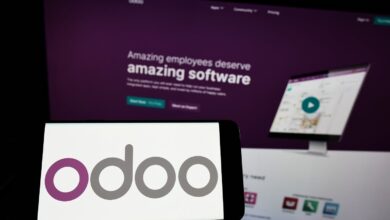6 Best Construction CRM Software for 2024

- Best AI-powered CRM software for customization: Salesforce
- Best for creating and sending quotes and invoices: Jobber
- Best for design coordination and collaboration: Procore
- Best for tracking projects through a pipeline: Pipedrive
- Best CRM tool for field and D2D sales management: SalesRabbit
- Best CRM tool with construction integrations: Capsule
Construction companies, agencies and general contractors can greatly benefit from implementing a customer relationship management tool. The software can act as a hub for all client information as well as facilitate collaboration between architects, site managers and builders. In addition to basic project management features, the CRM software can also track invoicing, quotes and payments.
Top construction CRM software comparison
The top general CRM providers typically offer process management, integrations and other general core features. The main features a construction company might look for in any CRM tool include project management and tracking, mobile application or invoice management.
Since the construction industry might require more niche features, some of the most popular providers offer specialized versions of their software or help customize their tool to meet a businesses exact needs.
| Software | Project management | Native or third-party integrations | Document and design tracking | Mobile app | Invoicing and quote management | Starting price* |
|---|---|---|---|---|---|---|
| Salesforce | Yes | Both | Yes | Yes | Yes | $25 per user per month |
| Jobber | Yes | Third-party only | Yes | Yes | Yes | $49 per month for 1 user, $29 for additional users |
| Procore | Yes | Third-party only | Limited | Yes | Yes | Contact for quote |
| Pipedrive | Yes | Third-party only | Yes | Yes | Limited | $14.90 per user per month |
| SalesRabbit | Yes | Both | Limited | Yes | Limited | Free starting price |
| Capsule | Yes | Third-party only | Limited | Yes | Limited | $18 per user per month |
*Starting premium price, when billed annually.
Salesforce: Best AI-powered CRM software for customization
Our star rating: 4.3/5
Salesforce is a cloud-based CRM tool that is entirely customizable. The sales platform and additional marketing, service and commerce products can be powered by artificial intelligence that construction companies can use to communicate internally, with customers and with partners. Salesforce’s AI assistant, Einstein, can generate reports, analytics, proposal drafts and more to be managed and tracked from their singular platform.
Pricing
- Starter Suite: $25 per user per month, billed annually. This comes with a simplified setup and onboarding; lead, account and opportunity management; email integrations and more.
- Professional: $80 per user per month, billed annually. This tier offers everything in Starter Suite plus forecast management, customized reports and dashboards and quoting tools.
- Enterprise: $165 per user per month, billed annually. This tier offers everything in Professional plus advanced pipeline management, workflow automations and more.
- Unlimited: $330 per user per month, billed annually. This includes everything in Enterprise plus predictive AI, premier success plan, full sandbox and more.
- Einstein 1 Sales: $500 per user per month, billed annually. This new tier includes everything in Unlimited plus Einstein Copilot, performance management and more.
Features
- Asset service management: Monitor service outcomes and create preventive maintenance plans on assets that are deployed on active sites.
- Einstein copilot: Access sales, marketing, service and commerce insights from a conversational AI tool that can give users predictive insights, recommendations and more.
- Contact center: Connect every channel of communication between reps, teams and even customers through the built-in contact center. Reps can resolve calls quickly or direct clients to live chat and messaging.
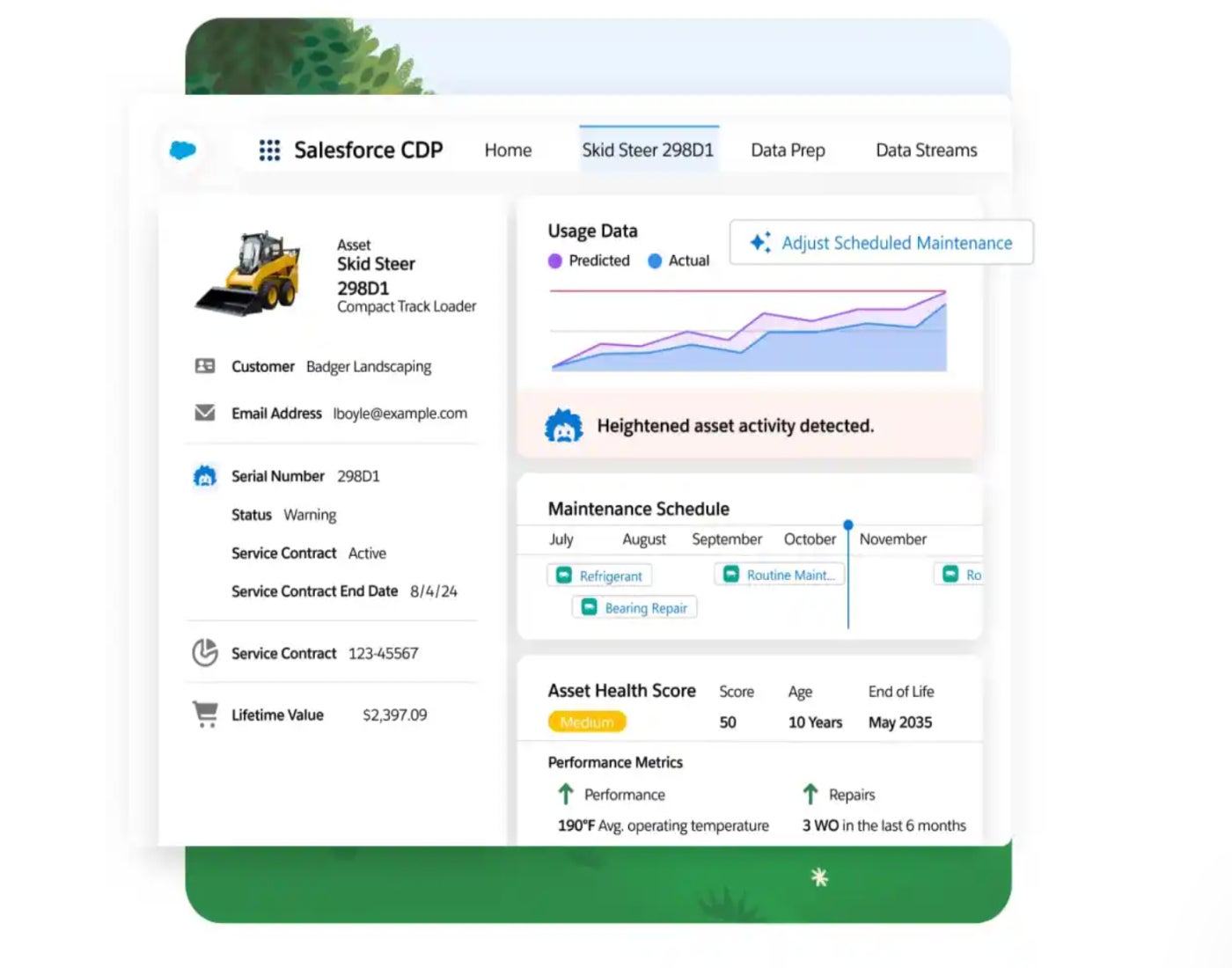
Salesforce pros and cons
| Pros | Cons |
|---|---|
| 30-day free trial. | Can be costly for small businesses. |
| Can be scaled up to meet the needs of enterprises. | Users report a steep learning curve. |
| 1,500+ applications to integrate. | Users report some platform bugs making the tool slow at times. |
Why we chose Salesforce
Salesforce is a top-scoring CRM tool that offers comprehensive suites of tools tailored to a variety of industries. The platform itself is extremely customizable, with a mix of features for building out unique workflows, reports and processes. In addition to these in-tool customizations, Salesforce’s pool of available apps to integrate with is extensive. All of which make it a viable option for any industry of any size with any existing tech stack.
Since Salesforce can be a pricey option, businesses might want a similar general CRM provider at a lower cost. If that’s the case, check out Pipedrive for their affordable tiers and customizable pipelines.
For more information on this provider, read our Salesforce review.
Jobber: Best for creating and sending quotes and invoices
Our star rating: 4.1/5

Jobber is an easy-to-use field service management tool with additional business operations software. Jobber allows users to build quotes in minutes, price jobs with precision, automate quote follow-ups and more. The quote builder tool keeps the customer in mind with professional and concise quotes and invoices. The software also offers consumer financing with a Wisetack integration, allowing clients to pay over time.
Pricing
- Core: $49 per month, billed annually, or $69 per month, billed monthly. This grants access for one user plus 24/7 self-service hub, job management and quoting tools.
- Connect: $129 per month, billed annually, or $169 per month, billed monthly. This supports up to five users, digital payments and automated invoice reminders.
- Grow: $249 per month, billed annually, or $349 per month, billed monthly. This tier supports up to 15 users, two-way message, QuickBooks online, job costing and more.
Features
- Credit card processing: Process payments with convenient payment options, automatic billing and instant payouts from the office or from the field.
- Time tracking: Automatically track visit times to maintain accurate and up-to-date timesheets.
- Lead management: Tag prospects as leads to manage them separately from active clients. This tool also integrates with Mailchimp and QuickBooks Online.
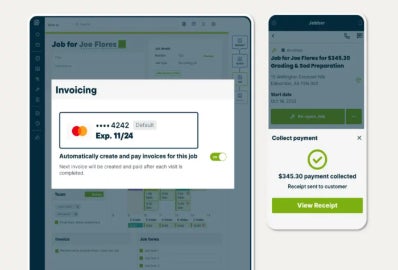
Jobber pros and cons
| Pros | Cons |
|---|---|
| 14-day free trial. | Limited features available in the Core plan. |
| Free product coaching. | Premium add-ons are costly. |
| 20+ built-in reports. | Users report limited advanced and custom analytics. |
Why we chose Jobber
Jobber serves over 50 home service industries by offering a platform where businesses can stay on top of requests from prospects, create quotes, schedule and manage jobs, and even make it easy to accept payment. These job tracking and customer communication tools make it a great option for small to mid-sized businesses looking for an industry-specific solution.
Jobber’s features make it perfect for general contractors but if you’re interested in a more scalable platform to fit your business size, consider looking into SalesRabbit or Salesforce.
Procore: Best for design coordination and collaboration
Our star rating: 4/5

Procore is a construction management software that helps owners, general contractors and speciality contractors save time and increase accountability. Procore offers a design coordinator software for construction for businesses to plan efficiently, communicate better and build faster from a single source of truth. Users can prevent rework before construction begins by housing all documents, reports, contact directory, tasks and coordination issues in one hub for all to view.
Pricing
Procore doesn’t offer standard tiers of support with upfront pricing. Businesses interested in getting an estimate or quote can request one by submitting their type of company and their average annual construction volume. Every subscription to Procore includes unlimited users, data and support.
Features
- RFI tracker: Submit a request for information (RFI) within Procore and attach images, drawings and details to streamline issues between teams or departments.
- Safety risk insights: Understand, predict and correct issues before they become problems by tracking data and inspection checklists in real time.
- Daily logs: Record project activities with mobile construction daily reports that view weather conditions, archive data and track manpower hours.
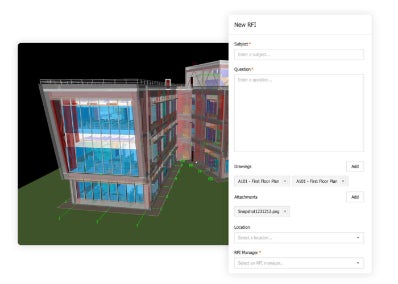
Procore pros and cons
| Pros | Cons |
|---|---|
| Offers a hands-on demo of their platform. | No upfront pricing. |
| Produces daily logs and insights. | Users report slow roll out of new features. |
| Manages time tracking and daily work logs. | Limited admin control over user and guest permissions. |
Why we chose Procore
Procore is a highly rated software that markets as an all-rounded platform suitable for a wide range of construction projects. Its products and over 500 integrations can help businesses across the world track projects with pre-construction tasks, project management and financial management.
Procore implementation into commercial, industrial and residential construction makes it a diverse option. But if you’re looking for a provider with even more scalability, check out Salesforce.
Pipedrive: Best for tracking projects through a pipeline
Our star rating: 4/5

Pipedrive is a scalable CRM tool that offers a mixed bag of features for pipeline management, activity tracking, reporting analytics and more. Businesses can create custom pipelines with a highly user-friendly interface to visualize every part of their sales and building process.
Pipedrive is also a cloud-based CRM solution that enables users to view contact information, project processes and contact suppliers wherever they have internet access. This way, project managers, site managers and contractors all know the status of each ongoing project.
Pricing
- Essential: $14.90 per user per month, billed annually, or $21.90 per user, billed monthly. Essential tier offers custom fields, data importing and exporting, product catalogs and more.
- Advanced: $27.90 per user per month, billed annually, or $37.90 per user, billed monthly. This tier includes everything in Essential plus important fields, two-way email sync, customizable email templates and more.
- Professional: $49.90 per user per month, billed annually, or $59.90 per user, billed monthly. This supports every feature in Advanced, plus contacts timelines, free Smart Docs add-on and more.
- Power: $64.90 per user per month, billed annually, or $74.90 per user, billed monthly. Power includes all Professional features plus phone support, 250 insights reports, 500 custom deals and more.
- Enterprise: $99.00 per user per month, billed annually, or $119 per user, billed monthly. This tier includes all features mentioned above plus security alerts and rules, unlimited open deals, custom fields, insight reports and more.
Features
- Pipelines and deals: Create custom fields with Pipedrive’s drag-and-drop interface, allowing users to visualize sales processes and move projects into the updated status with a click.
- Recurring revenue: Track all potential repeat customers or those who subscribe to an ongoing service your business provides.
- Invoice and billing: Generate, send and track invoices to clients directly from Pipedrive to your invoicing application.
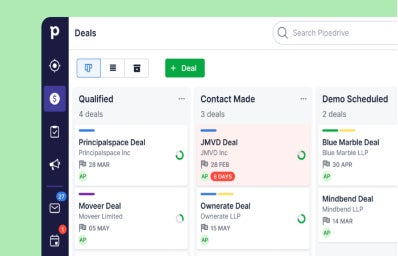
Pipedrive pros and cons
| Pros | Cons |
|---|---|
| 14-day free trial. | Doesn’t offer a free version of the software. |
| 400+ integrations. | Users report limited insights and reporting. |
| Users report simple and quick onboarding. | Premium add-on features can be costly. |
Why we chose Pipedrive
Pipedrive is a popular and innovative sales software that offers niche offerings for certain industries like automotive sales, banking and more. Its general tools can be scaled up or down to fit the size of any business, from startups to enterprises in need of a straightforward tool.
Pipedrive is a great general CRM software with an intuitive interface, if you’re a contractor or independent contributor wanting a similar option with a free tier, check out Capsule.
Head over to our Pipedrive review for more information.
Features
- Weather maps: Generate map overlays in-app so users can quickly pull up storm data. Data can go back two years and users can turn on notifications.
- Calendar integration: Sync all team members calendars to access availability and fill in or adjust appointments, all in seconds.
- Business search: Integrate with Google Places directory that maps out and pins businesses that match your typical clientele or ideal customer profile for reps to target.
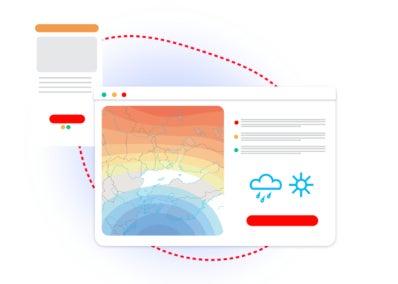
SalesRabbit pros and cons
| Pros | Cons |
|---|---|
| Provides a guided demo and video resources for those interested. | No built-in analytics and reporting features. |
| Simplistic dashboard and leaderboard. | Users report that upgrades to the platform are irregular. |
| Users report intuitive and easy note-taking when meeting with clients. | Users report syncs between the mobile app and main dashboard can be delayed. |
Why we chose SalesRabbit
SalesRabbit offers nine different capabilities that include Canvassing, DataGrid AI, Scheduler, Digital Contracts, Gamification, Proposals, Weather, Movers and Learn. All of these functions work together to produce an all-in-one platform to help businesses manage projects on the go. Users can access all nine tools through a single login. In addition to these native tools, SalesRabbit integrates with 30+ third-party integrations like Google Forms, Zapier and more.
SalesRabbit’s mobile app makes it easy for any team member to access scheduling, client information and invoicing. If you want a similar tool with a powerful mobile app plus even more financing features (such as accepting payments), check out Jobber.
Features
- Task management: Receive task reminder emails at the start of each day, plus automate workflows that initiate next steps once a task is completed.
- Mobile app: Access the same communications and task management tools through Capsule’s mobile app for iOS and Android.
- Custom milestones: Use Capsule’s prebuilt pipeline milestones or customize them to match your business’s exact workflow.
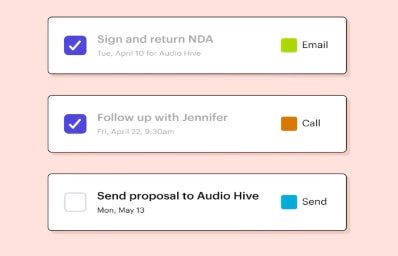
Capsule pros and cons
| Pros | Cons |
|---|---|
| 14-day free trial. | Free tier doesn’t integrate with accounting platforms. |
| Highly ranked internal customer support. | Limited integration with Google Workspace. |
| Offers two-factor authentication for mobile app access. | Features might feel capped for larger enterprises. |
Why we chose Capsule
Capsule is a simple CRM tool that provides sales pipeline dashboards, calendar and task management tools, Outlook and Gmail integrations and even two-factor authentication. Its workflow automations help businesses manage big projects without small details getting lost. Capsule also offers a free CRM version of their tool that can support up to two users, making it a viable option for independent contractors.
Even though Capsule offers a free version of their software, some of the premium features are sales and marketing focused. If you’re wanting a more industry-specific tool, consider looking into Jobber or Procore.
To learn more, check out our Capsule review.
How do I choose the best construction CRM software for my business?
Now that you have this list of the top construction CRM providers, consider requesting demos or signing up for the free trials of those on this list that peak your interest. This way, you can begin communicating directly with the provider and start onboarding the software as quickly as possible. The best way to shortlist these providers is to define the key construction-related features your business needs from a CRM tool and identify which provider matches your criteria.
Here are some sample questions to consider asking when choosing a construction CRM provider:
- Would your business benefit from an open-source CRM instead?
- Is the CRM scalable and detailed enough to fit your small business or enterprise?
- Does the CRM software integrate with tools you already have in your tech stack?
- Does the CRM provider offer features specific to your business needs, such as invoice tracking or document management?
FORUM: Here are some factors to consider when choosing a CRM.
Review methodology
To evaluate each provider and their offerings, I used an in-house rubric with criteria and subcategories, with a special focus on features related to the construction industry. Once I scored each CRM provider with this rubric, an algorithm calculated an overall star rating, which I then used to assign each software an ideal use case.
Below is a breakdown of the scoring criteria I followed:
- Cost: Weighted 25% of the total score.
- Core industry-related features: Weighted 25% of the total score.
- Customizations: Weighted 15% of the total score.
- Integrations: Weighted 15% of the total score.
- Ease of use: Weighted 10% of the total score.
- Customer support: Weighted 10% of the total score.
PREMIUM: Choosing the right CRM for your organization.


